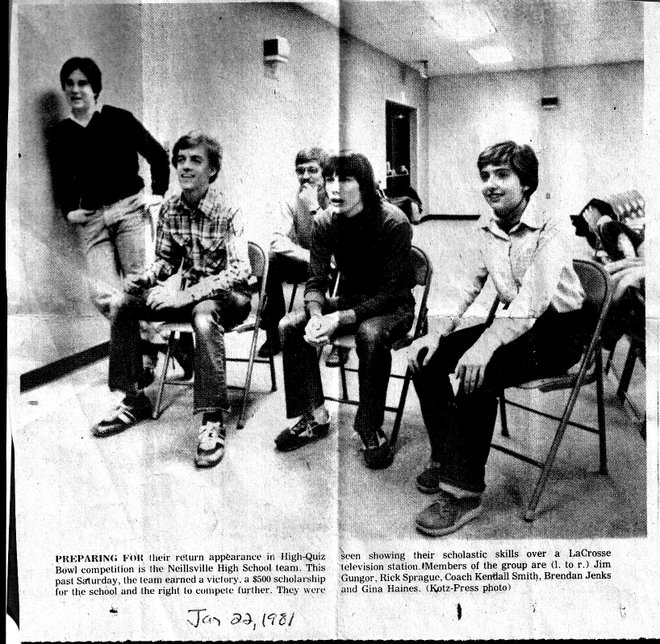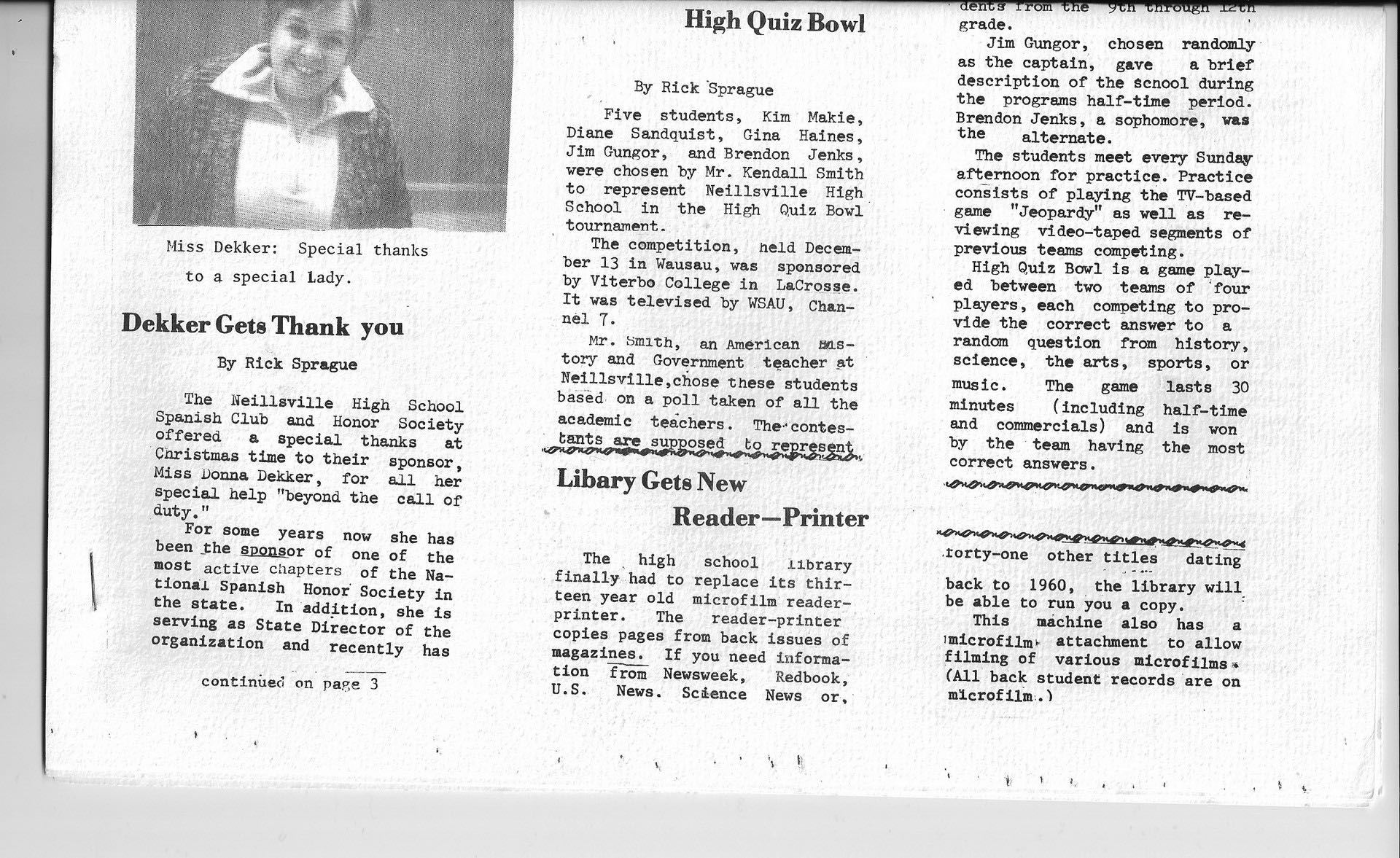10 High School Activities
City people are more specialized, and without doubt my (city-raised) children were far better-trained than I was at any activity that they focused on. But the number of hours in childhood hasn’t changed, so the flipside of focus is that they were exposed to less variety than I was, and I’m not sure that’s for the better.
My brother wasn’t interested in high school activities for their own sake, but he was still very active:
- At school, he played saxophone in the high school band, plus a school jazz band that performed at most basketball games during the winters
- Cross country runner. He was one of the best runners on the team, winning many awards.
- Car owner: paid for and maintained with his own money and time.
- Motorbike owner
- Boat owner: he bought a used speed boat and spent a winter fixing it into something we could use at the lake.
- Regular job at the grocery store (full time in the summers)
- “Capstone Project”: an ambitious year-long class his senior year where they planned and built an entire house, including foundation, from scratch.
He later became interested in scuba diving, acquiring all the equipment and gaining a certification to do deep-water diving. He once joined a group that traveled to Lake Superior to look at underwater shipwrecks. On one of those dives, he was something like 100 feet underwater when his breathing apparatus failed. Fortunately, his fellow divers took the “buddy system” seriously, so he immediately was able to share oxygen with another diver and together they safely made the long rise to the surface. He commented later at how much he was shaken by the idea he was so close to death. But Gary being Gary, he immediately jumped back in the water and continued the dive safely along with the rest of the crew. He wasn’t the type to give up easily.
I was more involved with school activities, but it was entirely by choice, not from parental pressure or anything other than because I thought it was fun and interesting. By graduation I was able to boast participation in the following activities:
- Editor of the school newspaper
- Copy editor for the school yearbook
- Manager for the school football team
- First chair in the school marching band
- Saxophonist in the school jazz band
- Debate team
- Co-star in the Junior and Senior class plays
On the side, in addition to all of the above, by age fourteen I had developed a passion around computers that gave me a focus to my activities and interests. I devoured every scrap of information I could, and this hobby served as a powerful motivator that had me begging my parents to drop me off at university libraries, out-of-town big city bookstores, exposing me to even more of the bigger world.
For a rural kid whose family income on my college application showed $8,000 per year, I never felt poor or underprivileged. If anything, our low income gave me the incentive to do more for myself, such as:
- A summer job working at a steel factory.
- Odd jobs including mowing lawns, growing and selling cucumbers in the summer.
- A daily paper route, forcing on me the discipline of getting up early in any kind of weather, and learning how to maintain and care for a bicycle.
I suppose it’s natural, and common, for teenagers to feel different and left out. But I don’t remember anyone in my family feeling lonely. These activities kept us in constant interaction with others – a rich variety of people from all the town’s income levels and occupations. We may not have had swarms of people crowding around us at lunch time, but there were enough other awkward kids around that we never sat alone.

10.1 The Warrior Post
Our high school newspaper was an optional club that was organized by Mrs. Bratz, an amiable if somewhat breezy older woman who taught the typing class and a few other so-called “business” classes. Mostly this curriculum was oriented toward students who intended to become office workers, which in Neillsville was assumed to be secretarial work. Mrs. Bratz ran the FBLA club too (Future Business Leaders of America), which I think was intended to help students develop a knowledge of how businesses are run, but since nearly all the members were girls – as were the other classes Mrs. Bratz taught, like accounting – I assume there wasn’t much that was taught in an MBA curriculum.

Besides being the only boy in Mrs. Bratz’ business circle, I found myself to be reasonably good at the job. Since early childhood, books and newspapers had always interested me, and now was my chance to do something that seemed more real: what I wrote would actually end up being read by hundreds of students!
In those days, before computers and word processors, writing a student newspaper involved a great deal of tedious and manual labor with typewriters. An article would be submitted in long-hand, then carefully transcribed on one of the school’s IBM Selectric typewriters, using a technique that today would seem outrageously primitive. To print the paper in columns, each article had to be typed, by hand, in a way that inserted spaces at appropriate places within the text so that the column would be “justified” left and right. That’s a simple setting on any modern word processor, but in those days it was entirely manual. Often that would be the most laborious part of the newspaper production, and as an underclassman that’s where I started on the paper.
Mrs. Bratz was an easy-going teacher who was open to whatever suggestions the students had, so soon I was proposing and then writing my own articles: news stories, human interest, and editorials. I turned out to be one of the more prolific authors – I enjoyed writing – and in some issues my byline was on so many articles that you might as well have just put my name on the masthead.
As a high school junior, I was technically under the supervision of an editor, who was a senior, but she wasn’t terribly organized and was if anything happy to let me do most of the work. Soon I was the de-facto editor, and by senior year I was the official editor, responsible for organizing the paper, choosing the stories, and finding writers to fill in the issue.
It was then that I learned something about management as well. Although I prided myself on being reasonably good at all the newspaper tasks, it was soon clear that I simply didn’t have the time to do everything. Even with the time, I wasn’t the best at some of the other important tasks, like selling or making advertisements, and at doing the art work. At first, I tried to micromanage everything, telling the artists specifically what to draw and where it should go, but soon I learned that this wasn’t very interesting to the artists, that they much preferred to express their own creativity. So soon I was delegating bigger tasks, and everyone was enjoying the paper writing.
10.2 Church Activities
And then there was always church, the center of all our activities. My siblings and I matter-of-factly participated in all the activities, including:
Singing: we didn’t have a formal choir, but we would have been in it if there had been one. As young children, we were regularly asked to sing at special events organized for the town elder care facilities, for example).
Our church participated in a statewide competition called Bible Quiz. The format was similar to a TV game show, where contestants competed to answer questions about the Bible. Two teams, each with four or five members, sat on a long table equipped with hand-held buzzers. The moderator asked a question that would be answered by the first person to hit the buzzer. The team with the most correct answers won.
We were issued workbooks of sample questions to prepare, but the emphasis each year was on a specific book of the Bible. In our first year, we did the book of Luke. Later we did 1st and 2nd Corinthians. Although most questions were simple facts pulled from the King James Version (e.g. “What was the name of Jesus’ mother?”), to do well required careful study of the entire book.
Our church team included me and my brother, plus Jimbo and a few girls. We had a good coach who pushed us to perform well, but nobody took the competition more seriously than me. Besides the statewide team rankings, there was a separate ranking of individual players. When the scores were announced a few weeks into the competition, we learned that our Neillsville team was among the best in the state – and I was ranking number one among hundreds of participants. This only drove me to prepare harder, and by the end of the year, I had essentially memorized all the books.
Scouting: we had an alternative to Boy Scouts that amounted to much the same thing, and we participated in innumerable campouts and service projects.
I’m not sure why our church felt the need to organize its own alternative to Boy Scouts, since back then the Boy Scouts of America was itself quite religious by today’s standards. Ours was called “Royal Rangers” and we had our own uniforms, scouting manual, and achievement badges. I suppose the Boy Scouts, which had to appeal to multiple religious denominations, wouldn’t have been able to go as deep into Bible instruction as we did. It really was a different age.